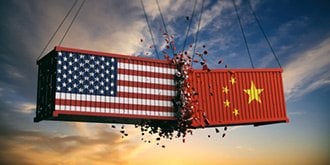On Sunday (Feb. 24), U.S. President Donald Trump announced that the United States would hold off on imposing a 25% tariff on $200 billion worth of Chinese goods on March 1.
Global markets surged after the announcement. The Dow Jones jumped nearly 300 points in Monday's trading session while the Shanghai Stock Exchange surged a record 5%.
But the optimism is misplaced. Not only are Chinese goods still taxed, but the 25% tariffs are very much on the table as the trade war drags on.
And that's one of the biggest threats to your portfolio right now...
Tariffs Are Here to Stay
According to a tweet from the president, February's trade talks with the Chinese government have yielded "substantial progress" on "important structural issues including intellectual property protection, technology transfer, agriculture, services, currency, and many other issues."
While Chinese trade envoys have made minor progress in Washington, evidence suggests that it may be too late to keep this trade war from kicking into high gear.
In fact, according to President Trump's top trade negotiator, aggressive tariffs on Chinese goods are likely to be in play for years to come.
However, Robert Lighthizer, the nation's top trade negotiator, urged caution following the president's announcement. America's increasingly sour trade relationship with China is unlikely to turn a corner anytime soon.
Powerful Investment Income Stream: The Treasury is sitting on an $11.1 billion money pool. By adding your name to a special distribution list, you could begin collecting $1,795 or more every month. Get the details...
According to Lighthizer, trade relations between the two nations are "too serious" for a quick fix.
"The reality is this is a challenge that will go on for a long, long time," he told lawmakers on Wednesday.
And for good reason...
[mmpazkzone name="in-story" network="9794" site="307044" id="137008" type="4"]
According to reports from Washington, February's trade negotiations have centered around critical issues in the nation's trade relations, including intellectual property theft and currency devaluation by the Chinese government.

Lighthizer believes there is little to no chance that issues of this magnitude will be resolved in a one-off trade deal.
"I don't believe this is going to solve all the problems between the United States and China," Lighthizer said. "We're going to be back here and working our way through problems, always with one eye toward the future."
You see, Lighthizer isn't just the chief negotiator with China - his office oversees the tariff regime.
And his office has not shelved new tariffs; they've merely "halted until further notice."
With tariffs still in play, China is unlikely to agree to any significant concessions. As a result, investors are left with a greater level of uncertainty over the trade war's next development.
And if past tariff hikes are any indication, the next wave of tariffs is likely to damage the bottom lines of major American firms that rely on raw materials from China for production.
This was the case last year, when Harley-Davidson Inc. (NYSE: HOG) announced an estimated loss of between $45 million and $55 million due to the initial wave of tariffs last February.
Meanwhile, America's largest car manufacturer, General Motors Co. (NYSE: GM), saw a $300 million increase in the cost of raw commodities over the course of 2018.
According to GM's former CFO Chuck Stevens, GM expects to face a $1 billion net headwind thanks to these price hikes and the long-term fallout from tariffs.
In fact, GM announced on Nov. 26 that it intends to significantly reduce North American operations due in part to rising material costs from tariffs.
In short, trade war uncertainty remains the top threat to your stock returns in 2019.
However, that doesn't mean your wealth has to suffer...
Millions of Americans Now Entitled to Collect "Federal Rent Checks"
Forty-six years ago, Congress passed an obscure piece of legislation known as Public Law 92-313. And today, it's why the Treasury is sitting on top of an $11.1 billion pile of money.
Fortunately, Americans from coast to coast have discovered a loophole that entitles them to a sizable portion of this cash.
And they're racing to add their names to a special distribution list.
Some are now receiving monthly checks worth $1,795 each. Others are collecting $3,000, $5,000, or more every month. If you want to join them in this powerful investment income stream, you better hurry up.
Because this cash is getting scooped up left and right! Read more...


